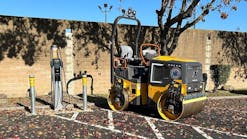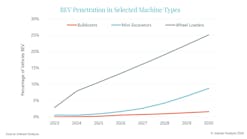A new white paper outlines practices that will help companies reduce equipment greenhouse gas emissions (GHG) on job sites while maintaining productivity and safety.
The United Rentals white paper, "Roadmap to Low-Emission and Zero-Emission Jobsites," provides four steps to reduce GHG and suggests digital tools and greener equipment options to support sustainability strategies.
“For companies with budgets large or small, reducing job site emissions is possible now,” said Grant Zoldowski, director of environmental management, in a statement. “A smart job site sustainability strategy starts with data. Targeting the predominant sources of emissions on projects and job sites allows companies to focus their efforts and dollars on changes that will yield the biggest results. This approach provides the foundation for more sustainable power generation, battery storage and electric equipment options.”
Read also: Managers Use Rental to Test Electric Equipment
Four steps to sustainability
- Use data to identify changes that yield the biggest return on investment.
- Consider new power generation options such as cleaner-burning generators that use propane, natural gas, renewable diesel, or hydrogen. Power options include combining solar panels with a battery to provide a quiet, zero-emission renewable energy generator.
- New energy storage solutions enable companies to reduce the use of emission-generating portable power equipment. Bigger and better standalone batteries have the power to replace some diesel generators. Hybrid power systems that use a battery to store excess power can slash generator run time along with fuel use and emissions.
- Electric equipment offers performance on par with diesel-fueled equipment while eliminating direct emissions. Lower operating costs and significantly reduced maintenance needs partially offset the higher upfront expense. Lithium-ion batteries and electric engines are essentially maintenance-free.
Read also: Sustainability is More than a Buzzword
“Renting provides an opportunity for companies to experiment with more sustainable solutions such as electric machines, portable power options, and battery energy storage systems without investing in new equipment," said Zoldowski. "All of these technologies can work together to reduce the reliance on petroleum-based diesel and help companies shift to lower-emission and even zero-emission fleets."






